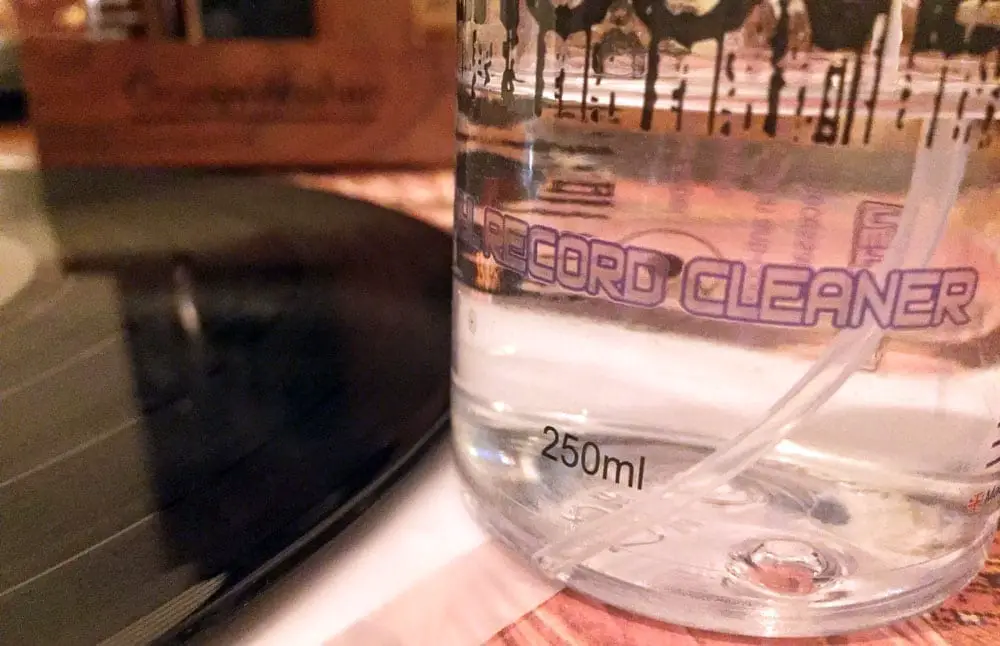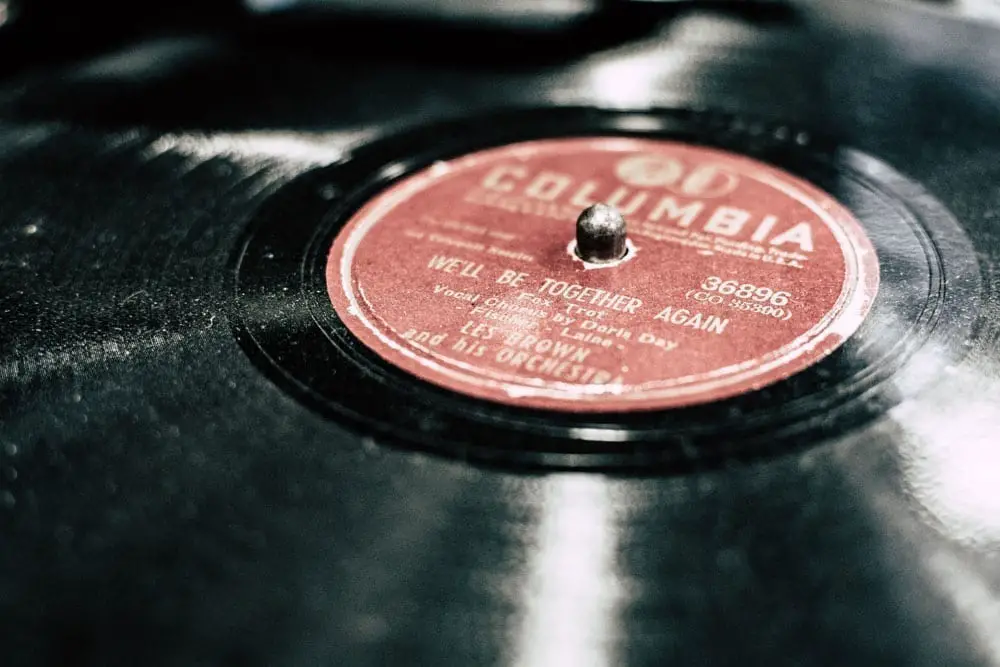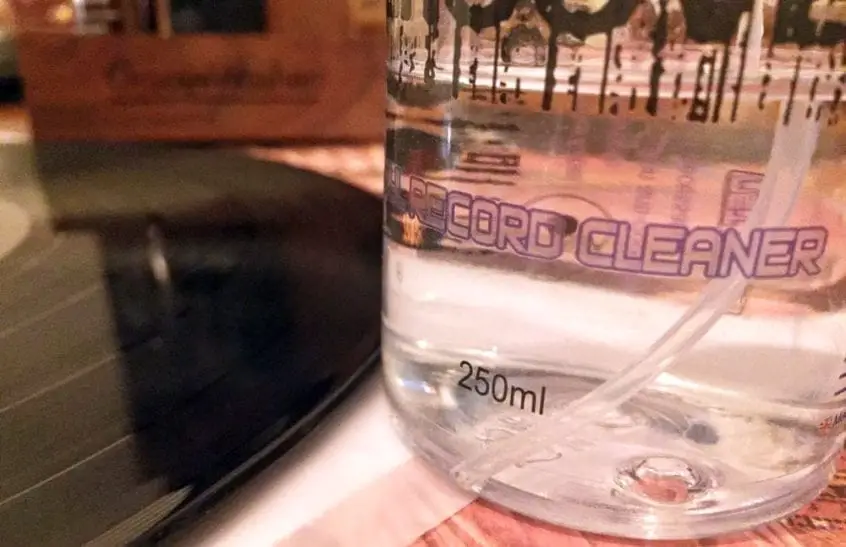There is much debate among the vinyl community around the use of alcohol to clean vinyl records. Isopropyl alcohol, in particular, is popular with many collectors as a key ingredient in homemade record cleaning solutions. But is it safe? Some collectors swear by it, others warn of potential hazards. To help shed some light on the topic, we’ve done a little further digging.

Many cleaning product manufacturers err on the side of caution when considering alcohol as a record cleaning ingredient. In our previous interview with GrooveWasher founder, Steve Chase, he explained why the creator of the original 1970’s Discwasher, Dr Bruce Maier stayed clear of high amounts of iso alcohol when cleaning vinyl records. “Dr Maier cautioned against fluids with high concentrations of iso alcohol,” explains Steve. “He stated that iso alcohol can remove plasticizers from the vinyl and make the groove brittle. Our G2 Fluid does not contain any iso alcohol. Some experts take pride in using high iso alcohol to clean their records. But it is not an effective hard surface cleaner. It evaporates too quickly to remove the contaminants. Try cleaning any hard surface with alcohol and you will see how poor a cleaner it is. The grime dries back onto the surface before you can wipe it away.”
GrooveWasher’s concerns about isopropyl alcohol are also shared by the manufacturers behind the popular Disc Doctor, who state on their website that iso alcohol can “…dissolve shellac surfaces, and cause the leaching of plasticizers from synthetic plastic pressings making them brittle and subject to excess wear.” They don’t rule out alcohol entirely, however, adding, “Methyl alcohol should also be avoided; undenatured ethyl alcohol concentrations must be kept to a minimum.”
Knowing that GrooveWasher contains a small amount of alcohol (just not iso alcohol), I asked Steve Chase to elaborate further. “The alcohol version we use dries a little slower than iso, with almost the same solvent and miscibility characteristics”, he explains. “The first concern with a cleaning solution is to do no harm. You can clean a delicate hard surface, like a vinyl record or shellac finished wood table, with a high alcohol glass cleaner, but you may destroy the object in the process. Why try to kill a fly with a hammer?! As an abundance of caution, one should have a bias toward a less powerful cleaning solution that may require multiple cleanings, instead of a powerful, possibly damaging fluid.”

Despite concern from many record cleaning manufacturers, there are plenty of advocates for the use of iso alcohol. One commentator from the now defunct website record-cleaner.co.uk wrote with conviction, claiming that isopropyl alcohol is safe. In short, “Nearly all records are made from Vinyl (polyvinyl chloride) which has excellent solvent resistant properties. The chance of isopropanol in any dilution causing a reaction is theoretically impossible.”
Our main commentator, Steve is aware of these arguments and was quick to solidify their position. “One argument I’ve seen on the audio forums is the claim that high alcohol doesn’t harm the PVC vinyl that makes up the bulk of the ingredients in record vinyl. However, just because PVC vinyl is resistant to iso doesn’t mean we should select it as a cleaning ingredient. The record may look clean but has the dirt dried back in the grooves?”
“When we experimented with the chemical families that Dr Maier used for his Discwasher record cleaning fluids, we found reaction tables for PVC vinyl, like this one. As you can see, isopropanol doesn’t react with PVC. Add acetic acid to it, however, and it melts PVC!”
“Given the choice, we decided not to use isopropanol. It smells like a hospital and dries too fast, from our experiments, compared to the alternatives. We use a small amount of alcohol (non-iso) in our G2 Fluid and SC1 Stylus Cleaning Fluid, mainly as a blending agent. All of the ingredients in our fluids are water-loving and blend quickly. The combination works well.”
The smell of an alcohol-rich cleaner is rather unpleasant, as I was reminded when recently digging out an old container of Clear Groove, which has a much higher quantity of alcohol than GrooveWasher.
The most alarming claim about iso-alcohol is that it can remove the “protective coating” of the groove. So while they might sound better at first, there is reportedly a risk that repeated use can irreversibly damage the groove.
However, when I dug deeper to find information on this supposed protective layer, I couldn’t find much information, anything I did find seemed to suggest that it’s a myth. There’s a good chance, I would say, that what they really mean here is the removal or leaching of plasticizers, as per Dr Bruce Maier’s research. Regardless, fears of iso alcohol’s effect on the vinyl record surface are fairly widespread, but despite these concerns, the internet (and the market for that matter) is awash with cleaning solutions that contain iso alcohol, often in quite high quantities.
Steve Chase added further comment on DIY cleaning, suggesting that while it might be safe when used sparingly, it’s not GrooveWasher’s preferred or recommended approach. “Isopropyl alcohol, in low concentration to total volume, appears to be safe to use on vinyl records”, explains Steve. “We don’t like it. But it is very popular with DIY record cleaning fluid makers. Some of the recipes we have seen are pretty scary. Again, we choose to use an abundance of caution with our records.”
So is it ok to clean vinyl records with alcohol?
The debate surrounding alcohol and vinyl records will continue for many years to come. I would love to be able to give you a decisive conclusion to this article, but the truth is, it’s difficult to draw a precise resolution one way or another.
I would say that while there seems to be a solid argument for isopropyl alcohol in lower quantities, erring on the side of caution seems sensible in the longer term. I would echo Steve’s preference for a moderate approach that might require you to repeat the process, rather than a heavy-handed approach that may pose some risk.
There appears to be some danger should the iso alcohol mix with any acetic acid, and given that acetic acid is found in vinegar, that alone presents some opportunity for problems (believe it or not there are some folk out there who will advocate cleaning vinyl records with vinegar. Crazy).
If you do decide to use isopropyl alcohol as part of your cleaning process, I would at least recommend rinsing the record after with distilled water to wash away any remnants left behind. In the case of shellac records, of course, alcohol-based record cleaners are a huge no-no.




Steve Chase is making sure his product remains profitable by undermining a cleaning solution you can buy for cheap. I use 99% isolated with a lintfree cotton disposable pad. I use one pad with the Iso on it and clean in circles, going with the groove pattern. I immediately use a second dry cotton pad to remove the dried haze. You would be shocked at the brown staining I get on the pad from cleaning. Most likely dried fingerprint gunk. I’ve noticed 100% of the time my cleaning has reduced pops and noise while making the record audibly louder and more defined. Steve Chase at Discwasher is full of HOGWASH. A guy trying to increase his profits selling unneeded snake oil IMO
I use the exact same technique and have had no issues in 10 years. I’m commenting to say that the brown staining is likely from cigarette smoke, which I always find leftover after cleaning older records from the 70’s. This cleaning method has worked for me for many years, but I’m always open to considering better methods. I haven’t tried mixing the alcohol with a touch of dish soap and distilled/deionized water, however. Maybe that works better?
How about mixing a small amount of iso with distilled or deionized water for ultrasonic cleaners
From what I understand, mixing in a small amount of a surfactant would be best as it will reduce the water’s surface tension and help aid the cleaning process when cleaning vinyl records in an ultrasonic machine.
Just yet another sales pitch!! Most who use Iso alcohol only use it to dissolve contaminants, then rinse in distilled water. I soaked a thrift store LP in Iso for a month, in a sealed container. Then I rinsed in distilled water. No damage to the LP at all! (label was already toast!) After soaking for 30 days it was every bit as flexible as it was before I soaked it! (In 91% isopropyl alcohol and distilled water) It played fine, just still had all the surface scratches. Total hogwash to falsely make a claim just to sell a product.
I disagree. While I make no secret that GrooveWasher is my preferred cleaning solution, the article was an attempt to get some balance on the two different views.
It’s a polarising topic in the vinyl community, and as the article concludes, there is no agreed industry consensus (except, of course, with shellac).
Ultimately, you do what works for you – I really don’t mind. As for the products I recommend, I stick exclusively to products I’d be happy to use myself. And hey, man’s gotta make a living somehow.
Happy spinning and enjoy the music, however you choose.
Integrating the various above information, a solution including water and alcohol seems quite safe and effective as long as you follow it up immediately with pure water. That should take care of all concerns. The assumption of using only a single cleaner with no follow up rinse seems glaring to me.
Windex. Has always seemed to give me that streak free shine…
[…] cleaning solution is entirely alcohol-free, which is great for those who are concerned about the possible detrimental effects of alcohol when cleaning vinyl records. The jury may still be out on this topic, but it’s certainly best to air on the side of […]
I have a wild suggestion… why not do some microscopic analysis of new & used records after using these various cleaning solutions? Everything I’ve read indicates a lot of guessing… and very little actual science. Aside from the known chemical interaction between acetic acid and the PVC, I see no science at all. In any case, technical grade alcohols (99.x%) are the only ones which should be used so as to keep deposition from impurities to a minimum. If you wish to dilute the alcohol to reduce strength, it’s better to start with the purest form and add distilled water yourself, as this puts you in control of what is ‘introduced’.
That is exactly what I did. I used 91 and 99% iso in my test. I left it sit on the vinyl until it evaporated. I did a test with rubbing and no rubbing. I detected no change in the vinyl at all using a microscope. For me, I only use a 20/80 mix with distilled water as a precleaner. Then I use distilled water and a surfactant to deep clean the grooves using a soft microbristle brush, then rinse.
The records are so clean they sound almost 3D.
Use an ultrasonic cleaner for your records. With any type of wiping or brushing you will ultimately push micro particles into the micro grooves. Using an ultrasonic cleaner with a filter will mean your records are as clean as they can be while not damaging your vinyl. Search for ultrasonic record cleaner and see what i mean.
I’ve found the Highs can end up sounding “Brittle” with using too much IPA in your cleaning fluid. For 100ml mixture I use:
90ml Distilled / RO Water
5ml Ilford Ilfotol
5ml 99.8% Isopropyl Alcohol
1 Drop Tergitol 15-S-3
1 Drop Tergitol 15-S-9
Works a treat! If you have problem “Scrunch” area then the Tergitol will fix that and no brittle top end when playing back with my microline stylus.
Ilfotol will leave a residue, from the research that I have done. It has been used to reduce the surface tension, but both tergitol products do that already. I don’t use alcohol in any concentration. Why risk plasticizer removal. It also alters the high frequencies on the records. The American and Canadian archival record cleaning solutions only use S3 and S9. That’s good enough for me. btw, BTW, I always rinse with distilled water.
[…] The Isopropyl point is reassuring, as I tent to avoid record cleaning products that contain very high levels of alcohol. […]
[…] experts, many of which contain high levels of isopropyl alcohol. Opinion varies on the use of alcohol to clean vinyl records, but many believe high amounts of it to be potentially harmful to your records. Please do yourself […]
[…] There is much debate in the audio industry as to whether or not it’s safe to use alcohol when cleaning vinyl. […]
It seems to me that the fact that people are using it and there is still, after many years of water under that bridge, no consensus, pro or con, proves that it is ok to use. The argument that IPA evaporates too quickly is ridiculous since an IPA wetted micro-cloth collects particles as it passes thru the grooves and the fast evaporation becomes a plus! One caution I would suggest though. Do not rub the label with ANY type of wet cleaner.